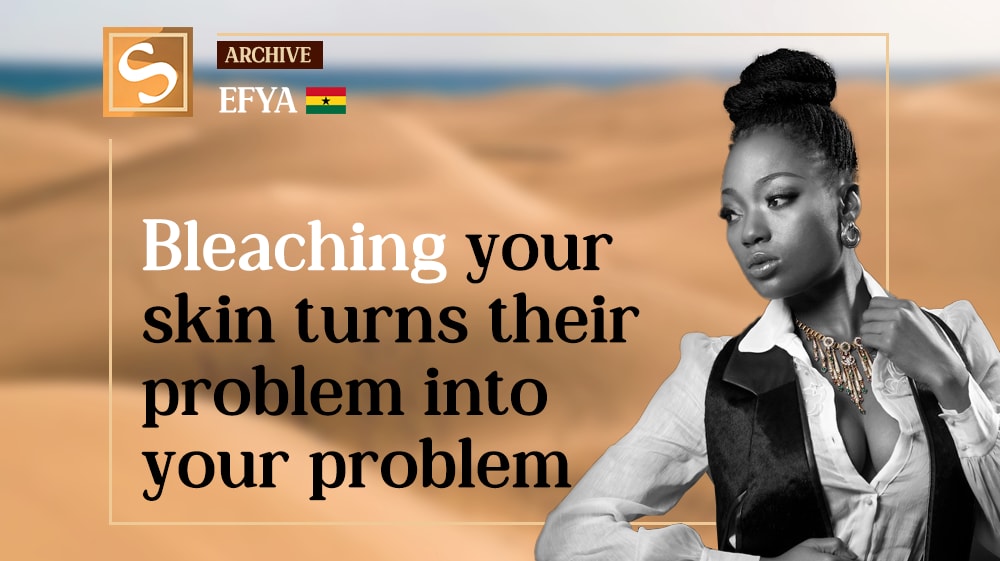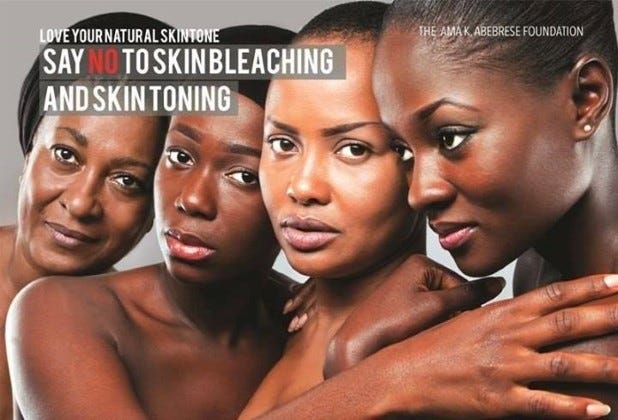Efya: My industry isn't fair, but skin lightening is not the solution
What lengths would you go to to gain a perceived advantage in an ultra competitive industry?
Those with fair skin go further. That’s the troublingly powerful message that the entertainment industry transmits.
My industry disproportionately projects and elevates light-skinned women in magazines, films, music and commercials. If there’s a fair girl in it then it’s most likely she’ll be the lead – affluent, attractive, desired, rich and successful.
I am not against light-skinned ladies being centre-stage or in the spotlight. I have personally used fair-skinned dancers and backing singers in my videos and live performances, not because of the shade of their skin, but because they had the right talent for the project.
In an ideal world, opportunity should always come down to how good you are at what you do, not how light your skin is. Yet this ‘fair girls go far’ belief is so deeply engrained in Africa’s entertainment industries that a generation of impressionable young people are being driven to seek brighter futures by lightening their skin.
Fair game
In west Africa’s entertainment hubs the perception is that it is much harder for dark-skinned women to get decent on-screen roles. Whether or not this idea of widespread industrial bias towards the fair is true, it’s the perception that’s almost as damaging as the reality.
Young dark-skinned aspirant actresses have told me that they feel discouraged to the point that they don’t even want to turn up to auditions because they believe they’re automatically at a disadvantage.
To improve their chances of making it in the most image-conscious of industries, many turn to skin lightening – and it’s not just young aspiring actresses.
Older women are doing it too. Even boys are supposedly doing it in Jamaica, as are middle-aged men are targeted in India.
I have never had to directly deal with this bias so far – not to my face at least, although who knows whether I have missed out on other opportunities due ingrain biases baked into someone else’s decision-making process.
Yet if someone were ever to suggest to me that I could, say, conquer the US and win a Grammy if I were to just lighten my skin a little, I would stand my ground and shut them down. Period.
I am fine as I am and, more to the point, I have total faith in my talent.
I would rather reach my career goals through working hard, working smart, and developing my gifts.
The solution is not the solution
I know women who are lightening their skin. What’s just as worrying to me is that it’s become so normalised that it’s not taboo, or even a cause for defensiveness. They’re open about it, almost proudly so.
They tell me they are doing it because they believe that’s how to get further along in life.
Someone should launch a skin lightening product called ‘Miss Sold Dreams’ for all those girls who have bleached and still didn’t get the attention or the success they wanted.
If you are compelled to bleach because you think it will solve a particular problem in your life, there is no guarantee that it will. The problem may still remain, and then what? Being dark skinned is not your problem – it’s a perverse society’s problem. Choosing to whitewash your beautiful skin turns their problem into your problem.
And fashions change. We’re in a world that changes daily. Lean ladies like Claudia Schiffer were in fashion in the 1990s but these days curvier ladies like Beyoncé are what girls aspire to. What if, one day, being fair skinned becomes unfashionable? All these girls who have spent all these years and all this money to become lighter, what will they do with themselves? Bleach themselves back to black?
Corporate manipulation
The companies that make these products profit out of people’s insecurities without regard to the impact that the messaging and the products have on people’s lives, both psychologically and physically.
It’s ridiculous the amount of money spent on skin lightening products [Companies and Markets estimate that, by 2018, the global market will reach nearly $20 billion].
The money that is spent on buying these products would be better invested in developing talents or learning new skills.
Companies would stop producing these products if consumers weren’t buying them. They’re only catering to public demand. So long as there is demand there’ll be someone there willing to meet it.
Of course a woman has every right to decide what she does with her body, but I only ask how far are you prepared to go and at what cost?
Are you also going to change the nose you don’t like, and the ear lobe you don’t like, and maybe the little toe on your left foot that you don’t like? You’re entitled to do what you want with your body, but how much are you willing to change?
We need to learn to derive more confidence from what lies within, that way, when someone tries to convince you to change something about yourself, you have the confidence to let them know that you are comfortable with who you are.
I’m writing this because I feel that we need to give our young women something greater to aspire to… themselves.
They need a new kind of self-confidence that comes not from how long your hair is, or how light your skin is, but a confidence that comes from deep within. A confidence that comes from knowing your potential, that comes from knowing what you’re good at, that comes from knowing that you can be great just by being yourself.
Look at India Arie, Serena Williams, Ama K Abebrese and Lupita Nyong’o. They are successful because they’ve invested time, money, blood, sweat and tears into becoming brilliant at what they do, all whilst maintaining who they are.
As a woman, no matter where you come from, you should have the self-belief that stems from knowing you are strong and special. Everybody has something about them that makes them special. If you find, develop, and use it, there’s no reason why you can’t become great.
But we’re too often blinded by trying to fit society’s model of what ‘special’ is. If 100 girls are all trying to stand out and be special, and to do this 99 girls decide to spend money on lightening their skin whilst the one remaining girl decides to spend time on developing her talents, at the end of the day none of the 99 girls will be special because they all now look like each other, and it’s the one girl who is dark and now even more talented who will stand out as special.
Think about it.
If you come from a poor or disadvantaged part of the world and you are looking for a way – any way – to gain an advantage in life, I know it must be tempting, especially if other people are doing it too.
When my mother gave birth to me at 25 her parents kicked her out. She didn’t go and bleach to create a better future for herself; she went to school.
One of the tracks that means most to me on my forthcoming debut album The Love Genesis (finally out soon!) is called ‘Strong Woman’, a song that pays tribute to the strength and resilience of the female heart.
Life will forever throw challenges at us, but if we call on our inner strength, we can survive and thrive. There are things you can do to make yourself a better person that don’t involve changing the colour of your skin.
I fully back those in the public eye like Ama K Abebrese and Nandita Das who are behind awareness campaigns that give young girls the confidence to know that being fair is not a prerequisite for being successful – it’s all about loving yourself for who you are, and working on improving your opportunities through improving your skills.
It’s a strong but really simple message: decide to be you, and then decide to be great at being you.
Jane Awindor, better known by her stage name ‘Efya’ is one of the most celebrated voices to emerge from Ghana, a soulful powerhouse and genre-defying pioneer who helped shape the alternative music wave across West Africa. A consistent, award-winning artist with a career marked by versatility and artistic depth, Efya bridges afro-soul, r&b, and highlife into something distinctly her own.
Connect with Efya on Instagram, X, Spotify, YouTube, and Facebook.




